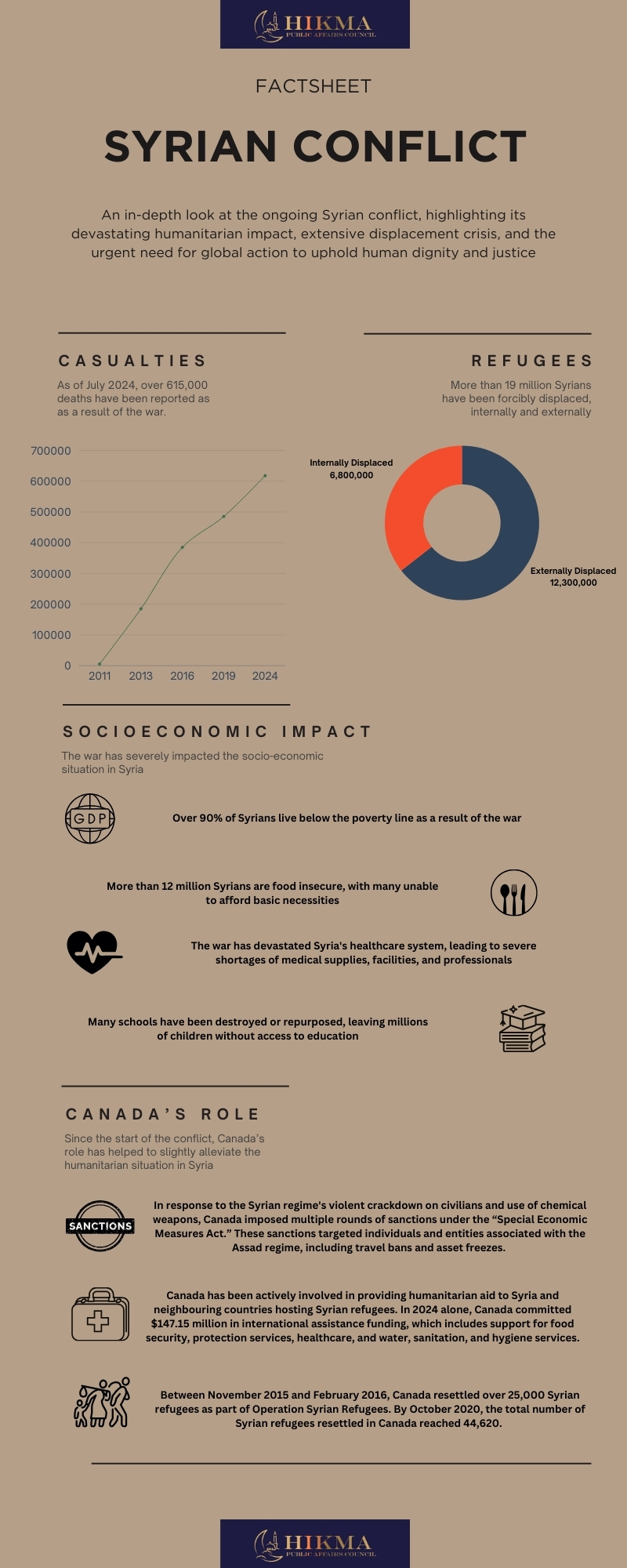The Syrian Conflict: A Humanitarian Crisis
The war in Syria, rooted in the oppressive dictatorship of the Assad regime, has been ongoing since 2011. This conflict has resulted in 617,910 deaths as of March 2024 and one of the largest refugee crises in modern history, displacing millions both internally and abroad. The humanitarian crisis has devastated Syria’s economy and infrastructure, severely limiting access to basic necessities like food, water, and healthcare, while also causing significant cultural and psychological damage.
A Prolonged Struggle
The international community has failed Syria through its lack of action, resulting in a prolonged conflict with no viable solutions in sight. As the world passively seems to accept defeat, the grave issues at hand have become disturbingly normalized. The civil war, which has left the country broken, began with the Arab Spring in 2011. Inspired by similar movements in Tunisia and Egypt, Syrians started peacefully protesting the decades-long injustice of the Assad regime. The Assad government responded with disproportionate force, killing and imprisoning tens of thousands of demonstrators and subjecting thousands to torture in prisons.
International Involvement
In the summer of 2011, Syria’s neighboring countries and global powers began to take sides, forming pro- and anti-Assad alliances. Along with other countries, the Arab League, United States, and Turkey ceased recognizing Assad as Syria’s legitimate leader. Meanwhile, the Syrian government’s previously established allies, Russia and Iran, increased their support of the regime. The power vacuum caused by the conflict led numerous groups with varying agendas and loyalties to enter Syria, attempting to either aid or defeat the Assad government, further worsening the humanitarian situation of the Syrian population.
Chemical Attacks and International Response
On August 21, 2013, the Ghouta Chemical attack saw Assad’s forces use chemical weapons against a civilian population, killing 1,400 people according to the US State Department. This prompted a reaction from the international community, with the United Nations Security Council adopting resolution 2118 (2013), which demanded the Syrian government destroy its chemical weapons arsenal. Canada was one of the leading nations to impose sanctions under the “Special Economic Measures Act”.
Canada’s Role and Refugee Resettlement
In November 2015, Prime Minister Justin Trudeau announced the withdrawal of the Canadian Air Force from Syria, leaving only surveillance forces and shifting focus to humanitarian aid. By March 2024, Canada has resettled over 40,000 Syrian refugees. Canada ranked first among 26 countries in Syrian refugee resettlement in 2019. However, the response to the government’s resettlement of so many refugees has also been criticized and comes with its own challenges.
Integration Challenges and Rising Islamophobia
According to the Canadian Government’s “Syrian Outcomes Report,” many refugees have been successful in their integration; however, others face significant challenges. There have been multiple reports of incidents of violence and hostility towards Muslim Syrian refugees, ranging from unsafe school environments to violent hate crimes. The arrival of many refugees from a country with an 87% Muslim population, especially during a time of anti-globalism, has contributed to the rise of Islamophobia in Canada.
The Ongoing Crisis
By 2022, the UN High Commissioner for Refugees (UNHCR) estimated over 306,887 civilians killed, 12.3 million civilians forced to flee the country, and 6.8 million internally displaced. Even today, the UN estimates that Syrians, in every subdistrict in the country, face some degree of “humanitarian stress,” with over 90% of the population living below the poverty line and facing substantial food insecurity.
A Call to Action
The Syrian conflict, like so many others, is not just about politics; it is fundamentally about human rights. Muslims and the global community alike must assist all those in need, including both those across the sea and in Canada. Making a difference in Syria, and for those affected, is not just a political objective but a moral imperative to uphold human dignity and justice.

Contribution by Layal Tassi, Hikma Intern
